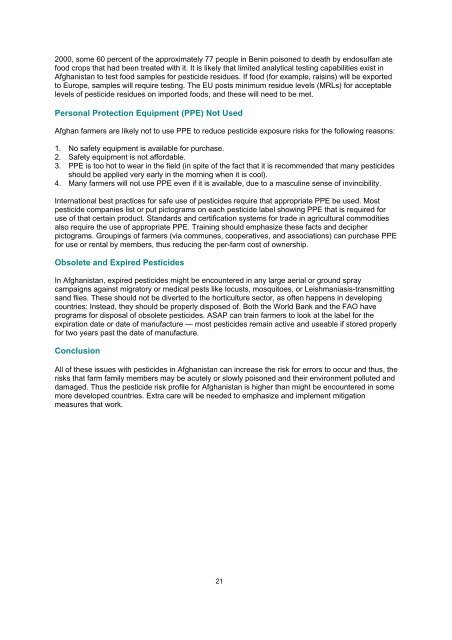Afghanistan Accelerating Sustainable Agriculture ... - part - usaid
Afghanistan Accelerating Sustainable Agriculture ... - part - usaid
Afghanistan Accelerating Sustainable Agriculture ... - part - usaid
Create successful ePaper yourself
Turn your PDF publications into a flip-book with our unique Google optimized e-Paper software.
2000, some 60 percent of the approximately 77 people in Benin poisoned to death by endosulfan ate<br />
food crops that had been treated with it. It is likely that limited analytical testing capabilities exist in<br />
<strong>Afghanistan</strong> to test food samples for pesticide residues. If food (for example, raisins) will be exported<br />
to Europe, samples will require testing. The EU posts minimum residue levels (MRLs) for acceptable<br />
levels of pesticide residues on imported foods, and these will need to be met.<br />
Personal Protection Equipment (PPE) Not Used<br />
Afghan farmers are likely not to use PPE to reduce pesticide exposure risks for the following reasons:<br />
1. No safety equipment is available for purchase.<br />
2. Safety equipment is not affordable.<br />
3. PPE is too hot to wear in the field (in spite of the fact that it is recommended that many pesticides<br />
should be applied very early in the morning when it is cool).<br />
4. Many farmers will not use PPE even if it is available, due to a masculine sense of invincibility.<br />
International best practices for safe use of pesticides require that appropriate PPE be used. Most<br />
pesticide companies list or put pictograms on each pesticide label showing PPE that is required for<br />
use of that certain product. Standards and certification systems for trade in agricultural commodities<br />
also require the use of appropriate PPE. Training should emphasize these facts and decipher<br />
pictograms. Groupings of farmers (via communes, cooperatives, and associations) can purchase PPE<br />
for use or rental by members, thus reducing the per-farm cost of ownership.<br />
Obsolete and Expired Pesticides<br />
In <strong>Afghanistan</strong>, expired pesticides might be encountered in any large aerial or ground spray<br />
campaigns against migratory or medical pests like locusts, mosquitoes, or Leishmaniasis-transmitting<br />
sand flies. These should not be diverted to the horticulture sector, as often happens in developing<br />
countries: Instead, they should be properly disposed of. Both the World Bank and the FAO have<br />
programs for disposal of obsolete pesticides. ASAP can train farmers to look at the label for the<br />
expiration date or date of manufacture — most pesticides remain active and useable if stored properly<br />
for two years past the date of manufacture.<br />
Conclusion<br />
All of these issues with pesticides in <strong>Afghanistan</strong> can increase the risk for errors to occur and thus, the<br />
risks that farm family members may be acutely or slowly poisoned and their environment polluted and<br />
damaged. Thus the pesticide risk profile for <strong>Afghanistan</strong> is higher than might be encountered in some<br />
more developed countries. Extra care will be needed to emphasize and implement mitigation<br />
measures that work.<br />
21

















